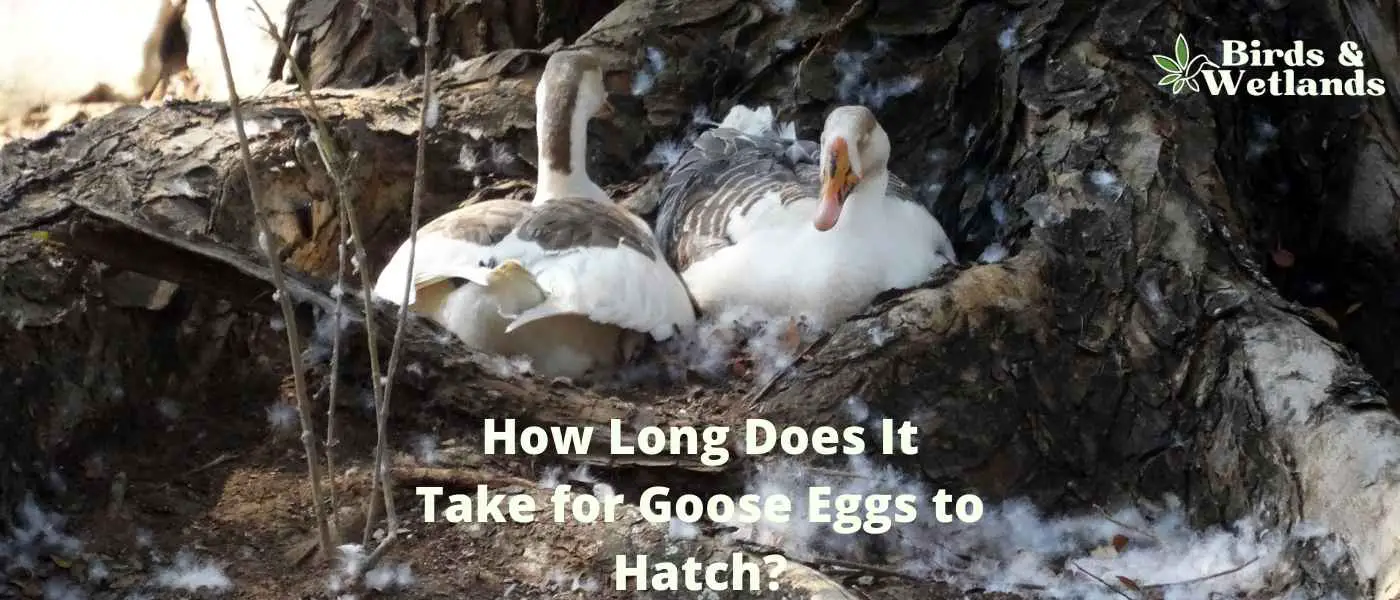On average, goose eggs take about 28 to 35 days to hatch, depending on the specific species. The African and Chinese geese breeds typically have a shorter incubation period of around 28 days, while larger species like the Toulouse or Embden geese require closer to 35 days. Throughout this period, the eggs need to be turned regularly and maintained at a consistent temperature and humidity to ensure successful hatching.
Lighter breeds may start to hatch sooner, while it may take longer for eggs from larger breeds to hatch. If you are incubating goose eggs, be patient and wait for them to hatch in due time. Do not remove the eggs from the incubator until hatching is complete.
How Long Do Geese Sit On Their Eggs?
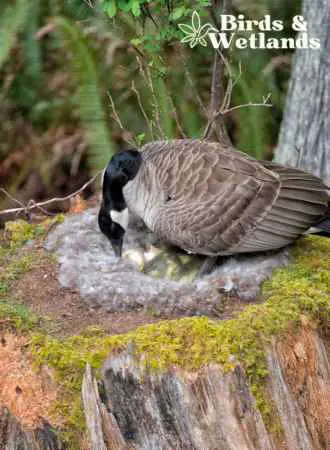
The incubation period of geese is around 28-30 days, although larger eggs can take up to 35 days to hatch. A goose lays eggs and may stay off the nest for several days before becoming broody. She lays one egg at a time, either once per day or once per two days. This means that she stops laying more eggs and starts to incubate her eggs.
During this time, the female goose will incubate the eggs, turning them regularly to ensure that they are evenly warmed. Meanwhile, the male goose will stand guard, sounding an alarm if any predators come too close.
A female Canada goose typically lays two to 9 eggs. Other goose species can lay up to 15 eggs. The number of eggs a goose will lay depends on several factors, including the age and health of the goose, as well as the availability of food and nesting sites.
Female geese generally start laying eggs when they are 2 to 4 years old. Geese typically lay eggs once a year, but some may lay two or even three clutches of eggs in a single year if conditions are favorable.
Do Geese Leave Their Eggs Unattended?
No, they rarely leave their own eggs unattended. Muscovy ducks generally do, however. Geese rely on the nutrition they build up and store prior to laying eggs. Ducks don’t have this same reliance.
However, some geese leave their eggs, especially those that live on a farm. Broody geese do leave their eggs. It is normal behavior for them to do this for up to an hour a day. The female goose will return to the nest to turn the eggs and care for them.
If predation is a concern, the parent geese may choose to stay with the eggs at all times. However, if there is no threat of predation, the geese will likely leave the eggs unattended for periods of time.
It’s actually really important your broody goose leaves her nest. She will get too hot and dehydrated if she stays there. Also, when she bathes, she brings back moisture to the nest on her feathers, which creates the correct humidity level necessary for the eggs to hatch properly.
So make sure to give your pet goose a break every now and then until her chicks hatch.
If a young goose sits on her own eggs and doesn’t eat or drink, she could die. If she stays in the nest for too long, she can become overheated and dehydrated, which can also be fatal.
Can You Hatch Goose Eggs Using an Incubator?
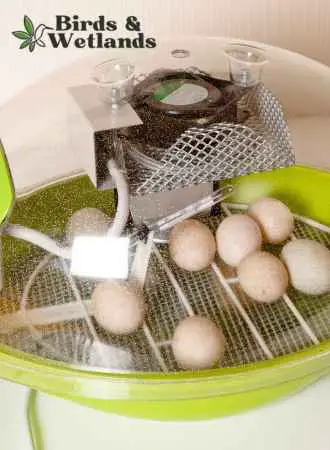
The best way to incubate and hatch goose eggs is by letting a broody goose sit on them. However, if this option is not available, you can always use artificial incubators.
Goose eggs need to be incubated at an incubator temperature of 99.5°F with a relative humidity of 60 to 65 percent for the duration of incubating with a forced air incubator or 100.5F for a still air incubator.
Use a wet-bulb thermometer to determine the right temperature. Additionally, incubators with slow air movement are better when hatching goose eggs.
The ideal humidity for goose eggs during incubation is around 70%, but you will want to increase the humidity to 80% when they are hatching. Goose eggs take around 28 to 35 days to hatch. You will need to turn them at least 3 to 5 times per day.
Most eggs are laid in the early morning so it’s better to collect eggs at a later time to avoid breakage. Don’t give your geese access to swimming facilities until you have collected all of the eggs for the day.
Clean dirty eggs with a damp cloth before putting them in the nest box. And on the 10th day, candle the eggs under a bright electric light should be done with the infertile eggs removed. Make sure you don’t miss a fertile egg. Doing so is important because a cloudy egg can potentially contaminate the other eggs.
And once the eggs successfully hatch, keep your own goslings warm using a heat lamp or heat pad.
Harris Farms Nurture Right Incubator
Your Reliable Assistant in Poultry Raising
Experience the marvel of life unfold right before your eyes with the Harris Farms Nurture Right Incubator. This state-of-the-art incubator provides the perfect environment for your eggs to hatch, ensuring a successful and rewarding poultry raising experience.

Pros
- 360-Degree View: With its clear, plastic construction, this incubator lets you witness every stage of the incubation and hatching process from all angles, making it an educational and awe-inspiring experience.
- Versatile Capacity: The incubator can accommodate up to 22 chicken eggs, 12-18 duck eggs, and 22-24 pheasant eggs, providing ample space for different poultry breeds.
- Auto-Stop Feature: The Nurture Right 360 has an auto-stop feature which halts egg turning three days before the expected hatch day, ensuring the embryos are in the correct position for hatching.
- Optimal Environment: With its built-in air circulating system and humidity control, this incubator maintains the ideal conditions required for egg incubation, boosting hatch rates.
- Built-In LED Egg Candler: The integrated LED egg candler allows you to test egg fertility and monitor the development of the egg and embryo without disturbing the incubation process.
Cons
- Requires Frequent Monitoring: While the Harris Farms Nurture Right Incubator is designed to maintain optimal conditions for hatching, it requires consistent monitoring to ensure temperature and humidity levels remain stable, which could be a challenge for busy individuals or beginners to poultry rearing.
So, in short, yes – you can use an incubator to hatch goose eggs! Just be sure to follow the proper protocols for temperature and humidity, and give the unhatched eggs plenty of TLC.
Can You Hatch Goose and Chicken Eggs Together?
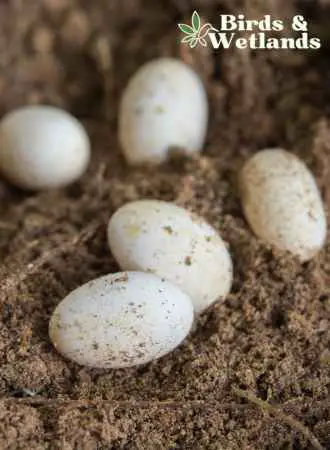
Raising chickens and geese together is not that difficult if you know what you’re doing. Actually, you can even hatch goose and chicken eggs together either naturally or using artificial incubation. However, there are some important things to keep in mind when incubating waterfowl eggs.
Chicken and goose eggs differ in size. Chicken eggs are typically smaller than goose eggs. This means that you will need to adjust the settings on your incubator accordingly.
Chicken and goose eggs have different incubation periods. Hen eggs typically take 21 days to hatch, while goose eggs take 38 to 35 days. This means that you will need to turn the eggs more frequently if you are incubating both types together.
It is important to make sure that the temperature and humidity levels in your incubator are configured correctly before getting your eggs set. If they are not, this could adversely affect the development of both chicken and goose eggs.
Goose eggs require more humidity to hatch than hen eggs. They should be sprinkled with warm water daily. However, too much humidity is bad so make sure it is well-controlled with setting eggs to hatch.
If you follow these simple guidelines, you can successfully hatch chicken and goose viable eggs together as well as raising geese on your own.
Conclusion on Goose Egg Hatching and Raising Goslings
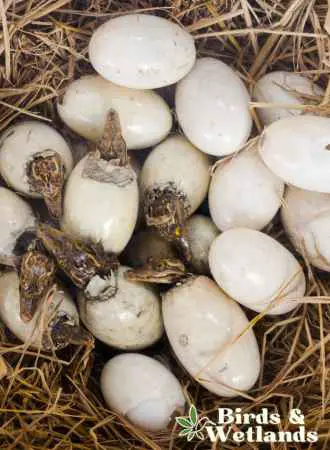
Most mature female geese lay eggs from February to May which is their usual breeding season, but this depends on the location and other conditions. For instance, Chinese breeds usually lay eggs in June or July.
Generally, it takes about 28 to 35 days of incubation before the eggs start pipping. Hatching eggs usually involve the mother goose sitting on the eggs to keep them warm and provide the right amount of humidity.
FAQs on Hatching Geese Eggs
Can You Hatch Out Goose Eggs Without an Incubator?
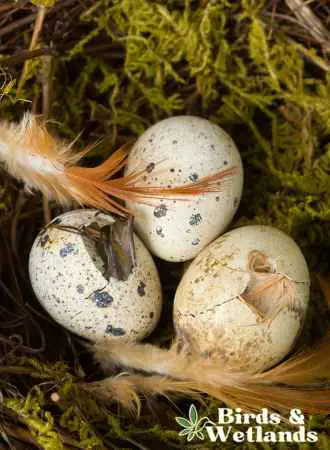
Yes, it is possible to replicate natural incubation without an incubator or a mother goose by using a surrogate bird mother. A broody hen or a Muscovy duck can successfully incubate a goose egg with her body and human help. This method requires careful attention to ensure that the goose egg is turned and the temperature regulated properly.
Place the eggs inside the nest box and let the hen discover the nest by herself. If you using nest boxes, make sure to line them with straw or shavings and shine artificial light through the day and evening.
Due to the large size of the goose egg, the chicken will need your help. Turning eggs by hand or using an automatic egg-turner is appropriate here.
This can be done and has been done successfully by many people. If you are interested in hatching out goose egg without an incubator, be sure to do your research and ask around for advice from those who have done it before.
It is possible to achieve a successful hatch out goose egg without an incubator, but it takes careful planning and attention to detail.
What Is the Difference Between a Forced-Air Incubator and a Still Air Incubator?
Forced-air incubators are used to incubate an egg. It has a fan that circulates warm air throughout the incubator, which helps to keep the eggs at a consistent temperature.
A still air incubator does not have a fan, and the eggs rely on convection to circulate the warm air. This can be more difficult to control and is not recommended for beginners.
There are a few things you need to consider when choosing an incubator, such as the size, the type of egg you want to hatch, and the humidity levels that are required. The size of the incubator will determine how many eggs you can fit inside, so it’s important to choose one that is large enough for your needs.
The type of egg you want to hatch will also dictate the type of incubator you need. For example, hen eggs require a different temperature than quail eggs. And finally, the humidity levels required will vary depending on the type of eggs you are hatching.
When setting up your incubator, you’ll need to make sure that the temperature is set correctly. The temperature should be between 99 and 102 degrees Fahrenheit for hen eggs, and between 97 and 99 degrees Fahrenheit for quail eggs.
You’ll also need to add water to the incubator in order to maintain the correct humidity levels. Too much or too little moisture can cause problems with the hatching process.

